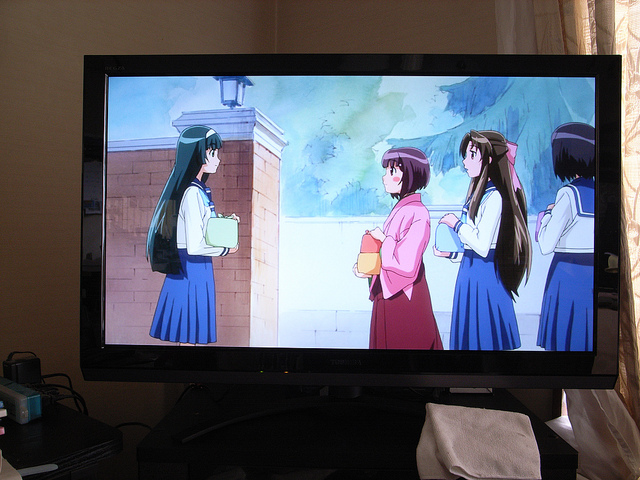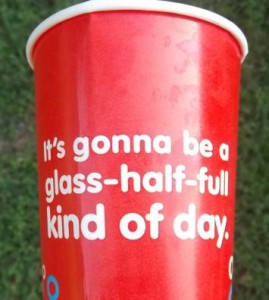Why You Should Definitely Be Watching TV for Language Learning Posted by Jakob Gibbons on Nov 16, 2015 in Archived Posts
Have you ever spent an entire Sunday binge-watching your favorite Netflix shows, only to end the day feeling like a useless lump? Now imagine if you could waste away for six hours in front of the TV and instead call it ‘study time’. For language learners, the television can be more than the mind-melting piece of electronics in your living room. You can have your delicious ten-season boxed set of Friends on DVD and eat it too!
We’ve all been taught for years that the idiot box is making us all idiots, which is certainly true in some cases, but its powers of entertainment can be used for more than evil. There are even debates in the lingo-blogosphere as to whether TV is a learning tool or a time waster. But I think the TV critics just haven’t yet figured out how to leverage the boob tube as the ultimate language learning tool that it is.
There are dozens of reasons and hundreds of studies on the benefits of television for language learning. Today I’ll give you three of my favorite reasons why you need to stop what you’re doing and tune in to the tube.
Because linguistics: watching television and language learning go hand-in-hand
Whether or not you were aware of it, the electronic babysitter played at least some role in helping you learn how to use your native language. It taught you how other native users spoke, and helped prepare you socially to participate in the culture that produced that language and its media.
This is because your brain, being the clever scientist that it is, insists on collecting massive amounts of data on a language before it ever gives you the green light to start using it. How many times do you think a baby hears the word ‘mama’ before ever finally saying it? And how much more time did they spend quietly observing the big adults using their fancy conjugated verbs and indefinite articles before stringing together a perfect native phrase like “Mama, I want a doggy”?
Statistical language learning is the brain’s way of amassing as much data as it can get to make more and more accurate generalizations about the way you use language. A great deal of this data comes from direct conversation, but even more of it comes passively from visual and auditory media. And there’s no repository of linguistic data quite like your TV set.
Your basic sitcom or soap opera features real humans using real mouths, lips, and vocal chords. They speak (more or less) like the average native speaker does in dialy life (compared to, for example, music: we normally don’t sing to each other outside of Disney movies).
Even more importantly, every scene is full of learning aids. It’s cool if you don’t yet know the words for kitchen objects — every time the TV chef talks about the frying pan they’re using, you’re making an audiovisual relationship between the phrase ‘frying pan’ and the metal dish sauteeing onions on the stove.
Tip: When you’re watching, try to focus on the new words and phrases you hear. How many do you understand right away from context, and which remain total mysteries? Try to hold onto these phrases (especially the ones easily learned in context) by repeating them, writing them down, and especially using them in conversation.
Because fun: language learning becomes organic when you use it for something you enjoy
Speaking of cooking, celebrity chef Julia Child famously learned to speak nearly perfect French within a year of moving to Paris. It sounds like an anomaly, but there’s a solid scientific reason for it: she loved speaking French.
If you’ve ever sat in a foreign language classroom, you’ve probably been subjected to faint attempts at making language learning ‘fun’. But it always feels a little forced when you try to turn learning into fun. You’re shoving the square peg through the circle hole — you can shove a couple corners in there, but it’s not really a good fit.
So instead of trying to take learning and turn it into fun, why not flip that approach on its head: how about starting with things that are already fun to you and repurposing them into language learning activities?
As both a teacher and learner, this is always my default approach. You should always start by thinking about what things you’re already doing for leisure and enjoyment in your daily life, and then try to see how you can fit a new language into them. But you can only play so many Spanish drinking games before your liver fails or you lose your job — that’s where the tube comes in.
Now, this only counts as ‘fun’ if you can find a show you really enjoy watching. I’m a bit of a news junkie myself, but at the end of a long day I don’t think of coverage and analysis of the day’s events as the most relaxing activity. I’d rather watch a crime drama or something with cool fictional characters that can entertain my brain without any of that messy critical thinking.
You should do the same. Football, cartoons, travel programs, the weather channel — whatever you like, there’s something on TV for you.
Tip: Try your best to recruit some (native speaker) friends and delve into a new show together. You’ll naturally be inclined to discuss the episodes you’re watching, and it’s an easy way to immediately start using new words and phrases in context.
Because peer pressure: you want to sound like everyone else
Imagine having this exchange in a random coffee shop in the English speaking world:
Barista: Hi, welcome to Barstucks! What can I get for you?
You: I want coffee.
Barista: Ok, want me to leave you some room for cream and sugar?
You: *confused stare, vague head movement*
Barista: Can I get you anything else today?
You: *glance at cash register screen* Here is two dollars and fifty-five cents. Thank you.
Barista: Okay, have a good one!
You: *run away in a wave of linguistic angst*
I’ve had this interaction in both foreign languages I’ve learned. Sure, I already knew my nouns — coffee, sugar — and basic verb conjugations — “I want” — but that doesn’t cut it here.
Unless textbooks have gotten a lot more practical since the last time I cracked one, you’re not going to find phrases like “what can I get for you?”, “want me to leave some room?”, or “have a good one” in them.
You generally learn your idioms and colloquialisms like these ones socially, in conversation. But often, especially for beginning learners, social situations are incredibly stressful, and you can’t spare any mental focus for anything but crafting the next clumsy sentence that’ll come out of your mouth. And as we all know from that one annoying friend who somehow makes all your stories about them, it’s almost impossible to be a good listener when you’re thinking about what you want to say next.
In this case, television is the complement (but by no means a substitute) to this kind of learning. It’s a safe space where you can just sit back and listen. Without the pressure of responding, all of your focus will land on the characters and what they’re doing or saying. And I bet the next time you chat with your language buddy they’ll use a couple phrases you recognize from last night’s latest epsisode.
Tip: Play the trial and error game with new idioms and colloquialisms you’re learning on TV, and don’t be afraid to make mistakes. Try using your new phrases in situations similar to those in which you saw them used, and experiment with when and where they’re appropriate. Don’t worry — the natives will usually tell you when you’re getting a little too crazy.
It’s true that you’ll need more than a remote control to become a prolific polyglot. But as a language teacher and language learning addict, I’ve never designed a study program that doesn’t necessitate some time sitting on the couch with a bag of chips, chilling out, and tuning in to the tube.

Build vocabulary, practice pronunciation, and more with Transparent Language Online. Available anytime, anywhere, on any device.








Comments:
Neil:
Is boob tube another word for the TV? I thought it was a tight top for women or something.
It’s a great article though! Very inspiring. I tend to read more than watch TV because personally I enjoy it more. I think if you can find a good novel with a lot of dialogue you can still pick up some colloquial speech. But of course it doesn’t help for pronunciation.
Transparent Language:
@Neil Ha! Yes, boob tube is indeed slang for TV in American English. In British English it refers to a women’s top, I think.
Aistritheoir:
I spent a month in Málaga recently and when I arrived with my moderate command of Spanish, I was like the proverbial rabbiit caught in the headlights. Those peskey Spaniards speak really fast!
So what I did was watch the TV and turned on the subtitles (for Spanish hard-of-hearing folk.) This was a great way to hear the langauge and SEE what was being said at the same time.
My understanding of spoken Spanish really improved over the month so when I got home (to Ireland) I sought out and found http://www.rtve.es/television/ where many of the programmes have Spanish subtitles or transcriptions of top class TV programmes.
And with Carlos, Rey Emperador, you can learn about history too.
De nada!
Jakob Gibbons:
@Aistritheoir Yeah, watching with target language subtitles is a great transition phase for learners who aren’t quite ready to forego the training wheels. You’re totally right: it teaches you to link all those crazy sounds you hear to the words you know (and might happen to be reading on the screen). Soon you pick up subconscious cues about what kinds of letters and sounds aren’t so prominently pronounced and then bam! Listening like a native 🙂
CARLOS ESTRADA:
Wow! I couldn’t agree more!!. This is exactly what I have been telling my students to do for years!. I believe television is not only a great tool, it is sometimes the only tool for people who live in an non-english speaking country and it is therefore the only chance at getting some real world english exposure. As for myself, I need to tell you that most of the english I have learned in my life has been learned by sitting countless hours in front of the tv, both for entertainment and learning.I am really grateful to all those shows I have watched over the years and I will keep on watching them for as long as I live!
Jakob Gibbons:
@CARLOS ESTRADA Glad to hear this works out for you and your students as well!
It’s great, as you said, for people who live outside the country where their target language is spoken, but also for after you’ve left the country and want to maintain your language skills. I watch more Dutch television than English now and sometimes I actually think my listening skills have even improved over when I still lived in the Netherlands!
Hellhound:
Tv shows are responsible for my advanced level english exam that’s for sure. I studied the basics at school (for like 8 years! Yeah, it s*cked!), I memorised the rules, and the grammar, and words, and poems, but I couldn’t form a decent sentence on my own before those shows. The secret is: I desperately wanted to understand the stories! First I was too inpatient to wait for my country to translate them, then got inpatient waiting for downloadable subtitles in my language, and now I’m too lazy to download even an english subtitle! So I watch them as they are. Hidden object games were a big help too. There is this part where you have to find objects from a list in a realistic and messy environment – it’s the perfect way to memorise words.
Jakob Gibbons:
@Hellhound This is great — it’s exactly what I meant with the bit about how fun leads to more organic learning. You just want to watch your shows, so you’ve already got a sincere interest in learning the language, which definitely pays off!
Richardlanguage:
I agree with this. I’ve had such good experience with this. I just wish that same-language subtitles existed for more programs. For example, I was looking all over for Farsi programs and films with Farsi subtitles.
Jakob Gibbons:
@Richardlanguage Yeah Richard, this is something that frustrates me too. I don’t think watching, for example, a Farsi movie with English subtitles is very helpful, because the two languages will compete for attention rather than working together and eventually English is gonna win out.
It looks like there are some ways to find subtitles in different languages though, especially if you have a movie or show already downloaded to your computer. This site gives some tips: http://www.techylabs.com/find-movie-subtitles-easily.html.
Happy viewing!